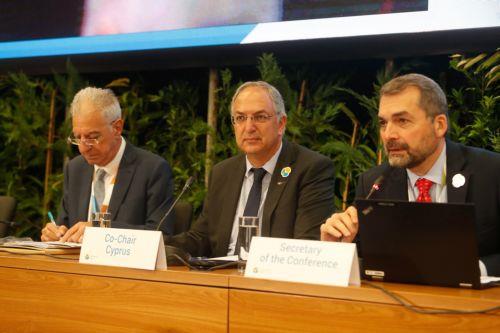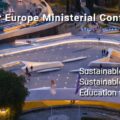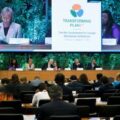Ministers who attended the 9th UNECE Ministerial Conference in Nicosia, adopted on Friday the ministerial declaration affirming countries’ commitment to a green economy transition with sustainable infrastructure at its core.
The declaration also calls on countries to join actions under the Global Tourism Plastics Initiative and underlines the need for more and stronger education for sustainable development.
It also includes strong statements on Russia’s aggression towards Ukraine.
The declaration underlines that sustainable and resilient infrastructure investment should be at the core of green economy policies and commitments, playing a central role in COVID-19 pandemic recovery plans.
New sustainable infrastructure should promote resource efficiency to reduce long-term environmental impacts, as a result of fostering innovation, nature-based solutions and cooperation with the private sector.
Particular attention was given to the importance of infrastructure development and tourism as major sectors concerned in transitioning to a green economy and how therefore it is critical to consider the environmental, social and health concerns of these industries. The declaration also calls on countries to join and commit actions to the Global Tourism Plastics Initiative that unites the tourism sector behind a common vision of circular economy of plastics, and the Glasgow Declaration: a commitment to a Decade of Tourism Climate Action.
Countries pledged to support efforts to reduce water and energy use and greenhouse gas emissions from tourism, particularly in high-impact sub-sectors (including cruise liners, aviation and accommodation), as well as to improve efficiency in the use of other resources, such as water. They further committed to improve sanitation, wastewater treatment and waste management.
The Declaration also “strongly condemns the unprovoked and unjustified aggression against Ukraine by the armed forces of the Russian Federation” and recalls the related UN General Assembly resolutions.
It recognises the need to assess the environmental consequences of the military aggression against Ukraine for both the country and the surrounding region and affirms ministers’ support to Ukraine in its reconstruction, including for providing subsequent assistance for restoration.
UNECE secretariat, in cooperation with UNEP, OECD and others are called upon to prioritize assessing the most urgent environmental needs in Ukraine based upon the methodology of the UNECE Environmental Performance Review Programme and on the results of ongoing and planned impacts assessments.
Ministers further invite international organizations to make recommendations to advance Ukraine’s sustainable recovery, in line with the Lugano Declaration adopted at the Ukraine Recovery Conference of last July.
The declaration highlights the need for more and stronger education for sustainable development to advance environmental governance, to strengthen environmental democracy and to empower learners of all ages with the knowledge, skills, values and attitudes to address the interconnected global challenges.
Countries furthermore acknowledged the progress achieved under UNECE multilateral environmental agreements and stressed their important role in supporting countries to achieve the Sustainable Development Goals and in enhancing environmental protection, industrial safety and in improving social, economic and health aspects of people’s lives across the pan-European region and beyond.
Special attention was given to the need for countries to engage with the Environmental Performance Review Programme and, to support a regular process of environmental assessment, apply the Shared Environmental Information System across the region.
Interventions after the adoption of the declaration
——-
After the adoption of the declaration, the floor was given for brief interventions, among others to a representative of the European Commission who welcomed the statements in the Declaration about Russia’s invasion of Ukraine and its effects on the environment. He noted that tourism must become more sustainable and also referred to the importance of education and innovation.
Deputy Minister of Environmental Protection of Georgia stated that the Conference in Nicosia reminded us of the importance of the close cooperation and coordination adding that the process Europe for the Environment is a unique platform.
Minister of Environmental Protection of Ukraine expressed his gratitude for the solidarity towards his country which is reflected in the declaration. He said the world must fight against “evil” and expressed confidence that Ukraine and the entire civilised world “will defeat Russia.”
Interventions were also made by a representative of the European eco forum who emphasised the need to get rid of coal and other fossil fuels and switch to renewable energy sources for a better future.
Minister of Education of Hungary invited everyone to a session on the environment in Budapest next summer.
A representative of the world’s scout organization emphasised the importance of participation and representation in such sessions by the youth as decisions are made for the future generations.
The Palestinian Environment Minister spoke about the importance of solidarity and the US Ambassador spoke about Russia’s violation of the international law.
She said that the war has cost human lives but also brought great destruction to the environment. She said her country is committed to, among other things, the 2030 agenda on global warming and declarations to reduce air and plastic pollution.
Egypt’s Minister of Environment briefed participants about COP27 next month in Sharm El Sheikh. Michalis Paradeisiotis, representative of a newly established NGO spoke of the work underway and a road map for recovery of Cyprus villages and communities which were devastated by the huge fires last summer.



